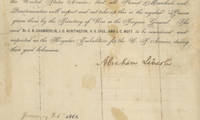President Abraham Lincoln Issues An Order So That Those Who Gave The Last Full Measure Of Devotion Could Be Returned To Their Loved Ones At Home - : He does not hesitate to overrule his top General, U.S. Grant

President Abraham Lincoln Issues an order So That Those Who Gave the Last Full Measure of Devotion Could Be Returned to Their Loved Ones at Home: He does not hesitate to overrule his top General, U.S. Grant
- Used
- Signed
This is the only such document that records show ever having reached the market
Before the mid-19th century, embalming was not typically used in funerary practice. It was mainly employed to preserve specimens after dissection. But all that changed with the Civil War. On February 20, 1862, Abraham Lincoln’s son Willie lay dying of typhoid fever in the guest bedroom of the White House. At 5 pm that evening, the 11-year-old took his last breath. Overcome with sorrow, the President cried: “My poor boy, he was too good for this earth. God has called him home. I know that he is much better off in heaven, but then we loved him so. It is hard, hard to have him die!” As the President struggled with the shock of Willie’s death, preparations for the funeral commenced. Henry P. Cattell, who later would handle Lincoln’s body after he was assassinated, was hired to embalm the little boy. Thus Lincoln himself, in arrangements for his son’s funeral, was an early adaptor of embalming.
Estimates of casualties in the Civil War range from 620,000 to 750,000. At least 254,000 Confederate and 370,000 Union soldiers died in the conflict due to war and disease. Reports from the battlefields detailed scenes of carnage and decay. Many dead soldiers were left where they fell, decomposing in fields and trenches all over the South, or ended up in mass graves. Their relatives and friends on the home front were left in constant anxiety. Relatives of the dead were left to mourn them in the absence of a body or to endure a time-consuming and expensive odyssey in search of their loved ones’ remains. There was an absolute outcry for fallen soldiers to be returned to their families for burial. Those who were identified and set aside for their relatives, especially Union soldiers, were often a long way from home. Transporting corpses that had already begun to decay presented a challenge. Railroads were resistant to shipping them due to the odor and the threat of infection. Enter the embalmers.
Embalmers following the Union armies around the country were viewed as performing a great public service by many, but there were those who portrayed them as vultures fattening themselves on the dead. Some embalmers pitched tents close to battle sites, and offered soldiers the chance to pre-pay for their own embalming should they be killed. On January 9, 1865, General Ulysses S. Grant cancelled embalmers’ permits and ordered them beyond the lines to stop them affecting morale and limit their activities.
But President Lincoln saw the matter differently, as this document indicates. In his mind was not the financial aspect that was paramount, but the grief and mourning of the families of the fallen. Getting their deceased sons, husbands and fathers home to them meant everything to him. He was, after all, the man who in his Gettysburg Address had promised that the Union dead “had not died in vain,” and spoken of them as having given “the last full measure of devotion”. He would not tolerate their bodies to be treated with anything less that the sincerest respect, and wanted them returned to their loved ones. His concern for the soldiers and the families of the dead was one aspect of the humanity, kindness, and empathy he displayed throughout the war.
So Lincoln himself intervened to contravene Grant's comprehensive ban, illustrating not merely the support he was prepared to provide to bona fide embalming surgeons, but his lack of hesitancy to overrule Grant. He issued permits to embalmers, with orders that they be given transportation and assistance. He also specified that they be given “everything relating to their business as Embalmers for the United States Armies,” a clear message to Grant.
Order signed, Washington, January 21, 1865. “The Quartermasters and Provost Marshals will give free transportation to Dr. C. B. Chamberlin, J. G. Huntington, A. S. Saul, J. C. Mott, and Assistants, to and from the Armies operating in Virginia, and those of the South and South-West, by regular Government Boats or Rail Roads, or any other Transportation that may be necessary for themselves, to, from, and in the Armies, and everything relating to their business as Embalmers for the United States Armies; that all Provost Marshals and Quartermasters will respect and not take up this or the regular Passes given them by the Secretary of War or the Surgeon General. The said Dr. C. B. Chamberlin, J. G. Huntington, A. S. Saul, and J. C. Mott to be considered and respected as the Regular Embalmers for the U.S. Armies, during their good behaviour.""
There is no record of another such order having reached the market.
It is interesting to note that this was not the first time Lincoln overruled a Grant eviction order; it had happened once before. On December 17, 1862, Grant had ordered Jews evicted from his jurisdiction, saying “The Jews, as a class, violating every regulation of trade established by the Treasury Department, and also Department orders, are hereby expelled from the Department.” Lincoln was highly displeased and revoked the order on January 3, 1863, saying there are Jews serving with valor in our armies. Grant later repudiated the order as well.
-
Bookseller
The Raab Collection
(US)
- Book Condition Used
- Date Published 21/01/1865